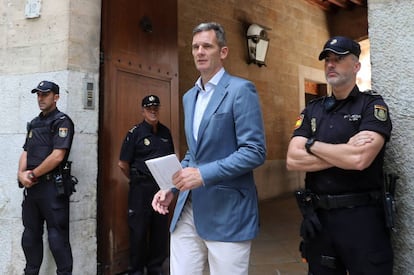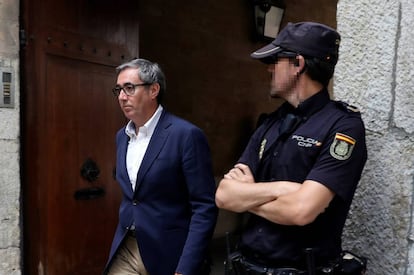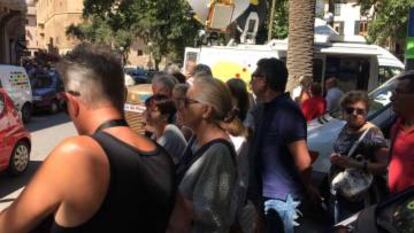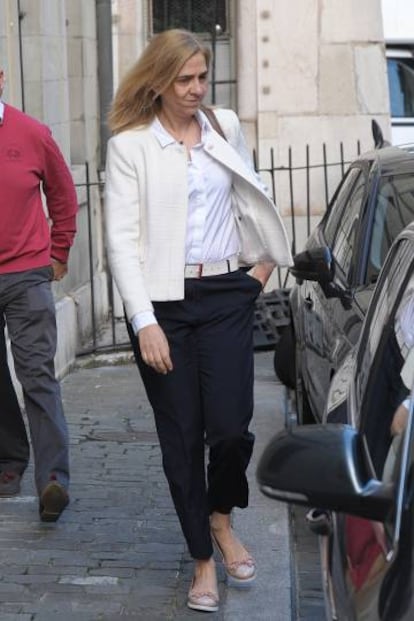Spanish king’s brother-in-law has five days to report to prison
A day after losing his Supreme Court appeal, Iñaki Urdangarin was served with a notice by the judges who found him guilty of graft crimes through his Nóos Institute

A court in Palma de Mallorca has given Iñaki Urdangarin, brother-in-law to King Felipe VI of Spain, five days to report to the penitentiary of his choice to serve out a five-year, 10-month sentence in connection with the Nóos graft case.
His business associate at the Nóos Institute, Diego Torres, was also given a five-day notice by the regional court that tried them and 17 other people for their role in a scheme to secure no-bid contracts from the regional governments of Valencia and the Balearic Islands.
Former Balearics premier Jaume Matas, who was also found guilty in the case, was expected to show up in court to pick up his own prison orders. Instead, Matas saved himself the humiliation of walking past the angry crowd outside the courthouse, choosing instead to report directly to Aranjuez penitentiary in Madrid. By 1.45pm, the one-time minister and regional premier was already in jail, where he will spend three years and eight months behind bars.

All three men lost their appeal to the Supreme Court, which yesterday upheld the convictions while shaving some time off their prison sentences. A fresh appeal to the Constitutional Court has not delayed the decision to send them to jail while that tribunal decides whether to accept the legal challenge.
Urdangarin has the right to file a clemency plea, although this does not necessarily entail avoiding prison, either. There is a precedent for this with another defendant in the Nóos case, former premier Matas, who asked for a government pardon in 2014 in connection with another conviction for influence peddling. Matas remained free while the government considered the plea, which was ultimately rejected.

Urdangarin, who is married to Cristina de Borbón – sister to Felipe VI – flew in from his current residence in Geneva to pick up the court order. His flight landed at Palma de Mallorca airport at 9.46am, and he showed up at the courthouse at around 12.15pm.
He stepped out of his car into a volley of insults from the gathered crowd, who called him a “thief.” He was inside the courthouse for around five minutes, then got back into his chauffeured vehicle and left for the airport.
Scores of reporters and onlookers milled outside the door of the Provincial Court on Wednesday morning to catch a glimpse of one-time media darling Urdangarin, who is a former Olympic handball player. His wedding to Cristina de Borbón in October 1997 was a highly publicized affair, and the couple were often seen at royal events. When the Nóos scandal broke in November 2011, it signaled a rift in relations as the royal household sought to distance itself from the graft case, which is thought to have played a role in Juan Carlos' decision to abdicate in favor of his son Felipe in June 2014. At that time, the monarchy’s popularity was at an all-time low.

The Nóos Institute was a non-profit foundation that served as a recipient of regional government contracts that were secured without public tenders, thanks to Urdangarin’s influence as a member of the royal family. He was described by former premier Matas as “a facilitator.”
Urdangarin and Torres used their non-profit to divert around €6.2 million from public contracts won for organizing sports events in the Valencia and Balearic regions into private accounts. Urdangarin’s wife, Cristina de Borbón, sat on the board of a company, Aizoon, that was allegedly used to channel part of these funds. Princess Cristina was made to testify in the case, and was ultimately fined for having benefited from her husband’s scheme. She was acquitted of the charge of tax fraud complicity.
English version by Susana Urra.
Tu suscripción se está usando en otro dispositivo
¿Quieres añadir otro usuario a tu suscripción?
Si continúas leyendo en este dispositivo, no se podrá leer en el otro.
FlechaTu suscripción se está usando en otro dispositivo y solo puedes acceder a EL PAÍS desde un dispositivo a la vez.
Si quieres compartir tu cuenta, cambia tu suscripción a la modalidad Premium, así podrás añadir otro usuario. Cada uno accederá con su propia cuenta de email, lo que os permitirá personalizar vuestra experiencia en EL PAÍS.
¿Tienes una suscripción de empresa? Accede aquí para contratar más cuentas.
En el caso de no saber quién está usando tu cuenta, te recomendamos cambiar tu contraseña aquí.
Si decides continuar compartiendo tu cuenta, este mensaje se mostrará en tu dispositivo y en el de la otra persona que está usando tu cuenta de forma indefinida, afectando a tu experiencia de lectura. Puedes consultar aquí los términos y condiciones de la suscripción digital.








































